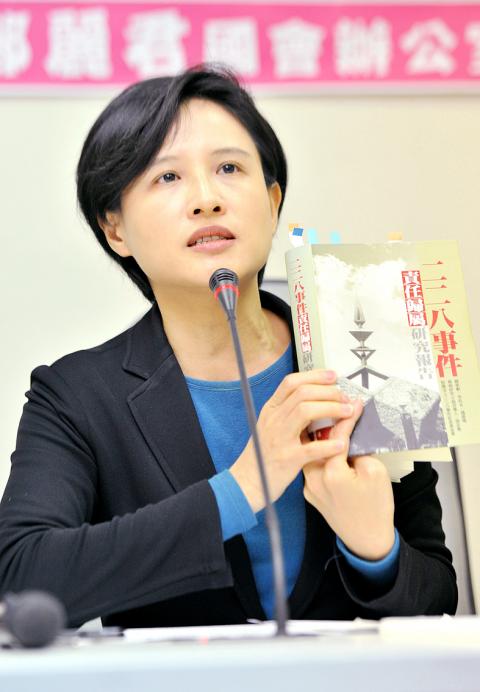President Ma Ying-jeou’s (馬英九) demand that academics relaunch a study of the 228 Massacre in 1947 is part of his de-Taiwanization effort, and the president owes the victims and their families an apology, Democratic Progressive Party (DPP) lawmakers said yesterday.
Showing a document issued by the Presidential Office to Academia Sinica which recommended the institution’s Institute of Modern History revisit the controversial incident and uncover the “real facts,” DPP lawmakers told a press conference that it was part of Ma’s de-Taiwanization effort.
The document stemmed from a letter to Ma from Chinese Maritime Transport Ltd chairman John Peng’s (彭蔭剛) on Feb 21, which asked Ma to rehabilitate his late father, Peng Meng-chi (彭孟緝), a former commander at the Kaohsiung Fortress.

Photo: Chen Chih-chu, Taipei Times
Peng Meng-chi was named by a government investigation into the massacre, published in 2006, as one of the people responsible for the deaths of many innocent Taiwanese as he had ordered a massacre in Kaohsiung, which later earned him the nickname the “Kaohsiung Butcher.”
“It is likely the last piece of the puzzle for Ma’s de-Taiwanization effort after the president’s attempt to revise high-school history textbooks last year,” DPP Legislator Chen Chi-mai (陳其邁) said.
Ma, who accused the DPP of a “desinicization” attempt when the party was in power between 2000 and 2008, has been trying to distort Taiwan’s history into one based on a China-centric perspective, evidenced by his instruction to merge Taiwanese and Chinese history textbooks in July last year, Chen said.
Chen also condemned Peng for his description of Taiwanese who died in the massacre as “thugs” in his letter, saying that Peng and Ma should apologize for vilifying those who perished and their families.
Chen has proposed legislation to subject those who deny or tone down the 228 Incident to up to five years in prison, referencing a German law on pro-Nazi violations.
Ma should explain whether he agrees with Peng’s view of the massacre and should “face the tragedy with humility,” DPP Legislator Cheng Li-chiun (鄭麗君) said.
“Ma’s attempt to rewrite history would be unacceptable in any other democracy, especially when many victims’ families who witnessed the massacre are still alive,” said DPP Legislator Hsiao Bi-khim (蕭美琴), who recently urged the government to extend the period victims’ families can apply for compensation because some were not aware that their relatives were executed until after 1996 — the deadline for applications.
Ma should be ashamed of his “two-handed strategy” — offering sympathy to the victims and their families every year on one hand, while trying to distort history on the other, Hsiao said.
Chen Yi-shen (陳儀深), an assistant researcher at the Institute of Modern History and an expert on Taiwan’s modern history, said various studies showed that Peng Meng-chi’s responsibility for ordering the massacre in Kaohsiung was “indisputable.”
Peng Meng-chi’s role in history should be remembered as more than just a commander who ordered the brutal massacre, Chen said, as Peng was later promoted to commander of the Taiwan Garrison Command, which was responsible for suppressing and killing many democracy activists during the White Terror period.

CHAOS: Iranians took to the streets playing celebratory music after reports of Khamenei’s death on Saturday, while mourners also gathered in Tehran yesterday Iranian Supreme Leader Ayatollah Ali Khamenei was killed in a major attack on Iran launched by Israel and the US, throwing the future of the Islamic republic into doubt and raising the risk of regional instability. Iranian state television and the state-run IRNA news agency announced the 86-year-old’s death early yesterday. US President Donald Trump said it gave Iranians their “greatest chance” to “take back” their country. The announcements came after a joint US and Israeli aerial bombardment that targeted Iranian military and governmental sites. Trump said the “heavy and pinpoint bombing” would continue through the week or as long

TRUST: The KMT said it respected the US’ timing and considerations, and hoped it would continue to honor its commitments to helping Taiwan bolster its defenses and deterrence US President Donald Trump is delaying a multibillion-dollar arms sale to Taiwan to ensure his visit to Beijing is successful, a New York Times report said. The weapons sales package has stalled in the US Department of State, the report said, citing US officials it did not identify. The White House has told agencies not to push forward ahead of Trump’s meeting with Chinese President Xi Jinping (習近平), it said. The two last month held a phone call to discuss trade and geopolitical flashpoints ahead of the summit. Xi raised the Taiwan issue and urged the US to handle arms sales to

State-run CPC Corp, Taiwan (CPC, 台灣中油) yesterday said that it had confirmed on Saturday night with its liquefied natural gas (LNG) and crude oil suppliers that shipments are proceeding as scheduled and that domestic supplies remain unaffected. The CPC yesterday announced the gasoline and diesel prices will rise by NT$0.2 and NT$0.4 per liter, respectively, starting Monday, citing Middle East tensions and blizzards in the eastern United States. CPC also iterated it has been reducing the proportion of crude oil imports from the Middle East and diversifying its supply sources in the past few years in response to geopolitical risks, expanding

An Emirates flight from Dubai arrived at Taiwan Taoyuan International Airport yesterday afternoon, the first service of the airline since the US and Israel launched strikes against Iran on Saturday. Flight EK366 took off from the United Arab Emirates (UAE) at 3:51am yesterday and landed at 4:02pm before taxiing to the airport’s D6 gate at Terminal 2 at 4:08pm, data from the airport and FlightAware, a global flight tracking site, showed. Of the 501 passengers on the flight, 275 were Taiwanese, including 96 group tour travelers, the data showed. Tourism Administration Deputy Director-General Huang He-ting (黃荷婷) greeted Taiwanese passengers at the airport and